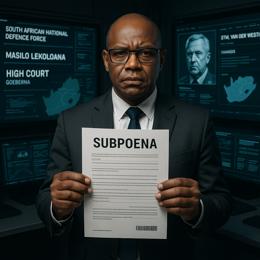Image created by AI
Judge Mandlenkosi Motha Questions All-White Legal Team in BEE Case
The recent directive by Judge Mandlenkosi Motha of the Pretoria High Court highlights a critical issue at the juncture of the legal profession and societal representation in South Africa. His concern over the absence of African advocates in a case concerning black economic empowerment (BEE) has sparked a significant dialogue regarding racial diversity among legal practitioners.
Judge Motha found it striking that in a case that fundamentally concerns empowerment and representation, there was a conspicuous lack of racial diversity in the legal team. This team of four white counsel was brought into sharp focus when the Judge directly addressed the matter, requesting a formal explanation.
The senior advocate's reaction to Judge Motha's move, as described by the City Press, suggests tension between the judiciary's expectations and the traditional practices within the country’s legal domain. The advocate's memorandum deeming the Judge’s order “inappropriate” betrays a disconnect between the practice of law and the underlying principles advocating racial equality and representation that the law itself seeks to promote.
This incident at the Pretoria High Court not only raises questions about hiring practices within the legal field but also encapsulates the broader societal challenges of racial inclusivity in post-apartheid South Africa. The dearth of black lawyers in a case that centrally addresses BEE policies brings to the forefront the conversation on whether the legal profession accurately reflects the demographic and values of the nation.
In South Africa, where the scars of apartheid still impact social and economic structures, the legal arena is not immune to scrutiny regarding the representation of historically marginalized communities. Judge Motha's action implies that the legal industry should not only administer justice impartially but should itself be a paragon of the diversity and integration that the country strives to achieve.
As the legal practitioners reckon with Judge Motha's pointed query, the situation brews a broader reflection on how inclusivity and representation manifest within the profession. The matter transcends the specifics of the case at hand and touches upon issues of access, equality of opportunity, and the meaningful incorporation of Black legal professionals in high-profile cases.
The judge's demand is, therefore, a significant moment for the legal community, marking a potential watershed wherein introspection might lead to action to remedy the sector's diversity deficits. The response from the legal team involved and the broader legal community will be indicative of the willingness to address these systemic challenges head-on.
South Africa is at a crossroads where each sector, including the legal fraternity, is called upon to reassess and realign its practices to mirror the nation's constitutional values. The implications of Judge Motha's concerns regarding an all-white legal team in a BEE-related case are profound. Should the profession heed the call, it could be a definitive step towards authentic inclusivity in South Africa's journey to redress its past and shape a fairer judicial system.










